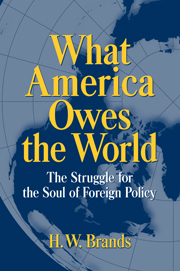Book contents
- Frontmatter
- Contents
- Preface
- 1 Exceptionalists All! The First Hundred Years
- 2 Brooks Adams: Marx for Imperialists
- 3 Walter Lippmann and a New Republic for a New Era
- 4 When the Future Worked and the Trains Ran on Time: Lincoln Steffens
- 5 Dr. Beard's Garden
- 6 Kennan, Morgenthau, and the Sources of Superpower Conduct
- 7 Reinhold Niebuhr and the Foreign Policy of Original Sin
- 8 God Blinked but Herman Didn't
- 9 On Wisconsin: Madison and Points Left
- 10 The Brief of Norman's Woe: Commentary and the New Conservatism
- 11 It Ain't Over till It's Over – and Not Even Then
- Note on Sources
- Index
7 - Reinhold Niebuhr and the Foreign Policy of Original Sin
Published online by Cambridge University Press: 25 March 2010
- Frontmatter
- Contents
- Preface
- 1 Exceptionalists All! The First Hundred Years
- 2 Brooks Adams: Marx for Imperialists
- 3 Walter Lippmann and a New Republic for a New Era
- 4 When the Future Worked and the Trains Ran on Time: Lincoln Steffens
- 5 Dr. Beard's Garden
- 6 Kennan, Morgenthau, and the Sources of Superpower Conduct
- 7 Reinhold Niebuhr and the Foreign Policy of Original Sin
- 8 God Blinked but Herman Didn't
- 9 On Wisconsin: Madison and Points Left
- 10 The Brief of Norman's Woe: Commentary and the New Conservatism
- 11 It Ain't Over till It's Over – and Not Even Then
- Note on Sources
- Index
Summary
Kennan's invocation of God and faith, while hardly the hinge of his argument, suggested that the religious element in American thinking about the world, so noticeable in the nineteenth century, still lived. American anticommunists during the 1950s certainly made much of the “godless” character of the Soviet and Chinese regimes, and as Kennan and Morgenthau both noted, with more than a little dismay, American attitudes toward the world frequently betrayed the mentality of a religious crusade. As always, Americans tended to assume that God was on their side in matters of international affairs.
Yet the Manicheism of popular anticommunism hardly exhausted the range of religious thought on the appropriate role of the United States. Kennan and Morgenthau both probed the subtle question of whether the kind of morality religions prescribed for the private realm applied to relations among states. Because they approached the intersection of religion and foreign policy from the latter direction, though, the religious aspect of their analyses was intermittent and unsystematic.
Reinhold Niebuhr arrived at the crossing from the religious side. The son of a minister of the German Evangelical Synod, Reinhold – along with brother H. Richard, who also became a distinguished theologian – grew up in small-town Missouri. Reinhold took a master's degree at Yale Divinity School, then worked for a decade as pastor of a middle-class parish in Detroit before joining the faculty of the Union Theological Seminary in New York.
- Type
- Chapter
- Information
- What America Owes the WorldThe Struggle for the Soul of Foreign Policy, pp. 182 - 208Publisher: Cambridge University PressPrint publication year: 1998



